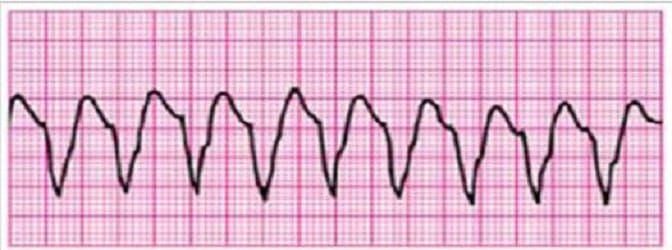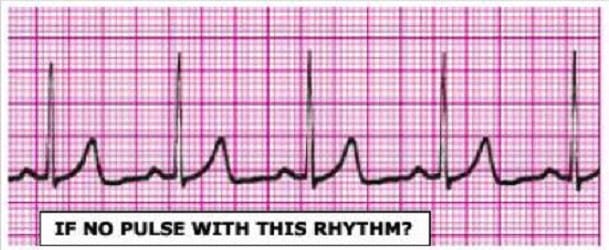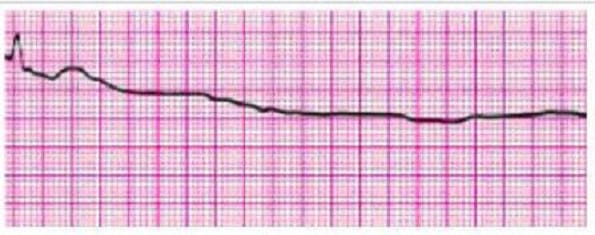Exam Details
Exam Code
:ACLSExam Name
:Advanced Cardiac Life SupportCertification
:Test Prep CertificationsVendor
:Test PrepTotal Questions
:301 Q&AsLast Updated
:Apr 11, 2025
Test Prep Test Prep Certifications ACLS Questions & Answers
-
Question 161:
SIMULATION
Describe the use of a curved versus straight laryngoscope blade.
A. The curved blade is designed to fit into the vallecula, whereas the straight blade is used to lift the epiglottis.
-
Question 162:
SIMULATION
The recommended dose of epinephrine injected into the adult tracheobronchial tree should be:
A. 2.0–2.5 times the IV dose in 10 mL of solution
-
Question 163:
SIMULATION
What is the drug treatment priority list in treating unstable bradycardia?
A. Oxygen, then atropine, then a dopamine drip at 5–20 mcg/kg/min, and then epinephrine at 2–10 mcg/ min.
-
Question 164:
FILL BLANK
Breath sounds cannot be heard following endotracheal intubation. What is the most likely problem?
A. Esophageal intubation
-
Question 165:

Identify the rhythm by selecting the best single answer:
A. Normal sinus rhythm
B. Sinus tachycardia
C. Sinus bradycardia D. Reentry supraventricular tachycardia
E. First-degree AV Block
F. Second-degree AV Block (Mobitz 1 Wenckebach)
G. Second-degree AV Block (Mobitz II Block)
H. Third-degree AV Block
I. Atrial fibrillation
J. Atrial flutter
K. Monomorphic ventricular tachycardia
L. Polymorphic ventricular tachycardia
M. Coarse ventricular fibrillation
N. Fine ventricular fibrillation
O. Agonal rhythm/asystole
P. Pulseless electrical activity
-
Question 166:

Identify the rhythm by selecting the best single answer:
A. Normal sinus rhythm
B. Sinus tachycardia
C. Sinus bradycardia
D. Reentry supraventricular tachycardia
E. First-degree AV Block
F. Second-degree AV Block (Mobitz 1 Wenckebach)
G. Second-degree AV Block (Mobitz II Block)
H. Third-degree AV Block
I. Atrial fibrillation
J. Atrial flutter
K. Monomorphic ventricular tachycardia
L. Polymorphic ventricular tachycardia
M. Coarse ventricular fibrillation
N. Fine ventricular fibrillation
O. Agonal rhythm/asystole
P. Pulseless electrical activity
-
Question 167:

Identify the rhythm by selecting the best single answer:
A. Normal sinus rhythm
B. Sinus tachycardia
C. Sinus bradycardia
D. Reentry supraventricular tachycardia
E. First-degree AV Block
F. Second-degree AV Block (Mobitz 1 Wenckebach)
G. Second-degree AV Block (Mobitz II Block)
H. Third-degree AV Block
I. Atrial fibrillation
J. Atrial flutter
K. Monomorphic ventricular tachycardia
L. Polymorphic ventricular tachycardia
M. Coarse ventricular fibrillation
N. Fine ventricular fibrillation
O. Agonal rhythm/asystole
P. Pulseless electrical activity
-
Question 168:

Identify the rhythm by selecting the best single answer:
A. Normal sinus rhythm
B. Sinus tachycardia
C. Sinus bradycardia D. Reentry supraventricular tachycardia
E. First-degree AV Block
F. Second-degree AV Block (Mobitz 1 Wenckebach)
G. Second-degree AV Block (Mobitz II Block)
H. Third-degree AV Block
I. Atrial fibrillation
J. Atrial flutter
K. Monomorphic ventricular tachycardia
L. Polymorphic ventricular tachycardia
M. Coarse ventricular fibrillation
N. Fine ventricular fibrillation
O. Agonal rhythm/asystole
P. Pulseless electrical activity
-
Question 169:

Identify the rhythm by selecting the best single answer:
A. Normal sinus rhythm
B. Sinus tachycardia
C. Sinus bradycardia
D. Reentry supraventricular tachycardia
E. First-degree AV Block
F. Second-degree AV Block (Mobitz 1 Wenckebach)
G. Second-degree AV Block (Mobitz II Block)
H. Third-degree AV Block
I. Atrial fibrillation
J. Atrial flutter
K. Monomorphic ventricular tachycardia
L. Polymorphic ventricular tachycardia
M. Coarse ventricular fibrillation
N. Fine ventricular fibrillation
O. Agonal rhythm/asystole
P. Pulseless electrical activity
-
Question 170:

Identify the rhythm by selecting the best single answer:
A. Normal sinus rhythm
B. Sinus tachycardia
C. Sinus bradycardia
D. Reentry supraventricular tachycardia
E. First-degree AV Block
F. Second-degree AV Block (Mobitz 1 Wenckebach)
G. Second-degree AV Block (Mobitz II Block)
H. Third-degree AV Block
I. Atrial fibrillation
J. Atrial flutter
K. Monomorphic ventricular tachycardia
L. Polymorphic ventricular tachycardia
M. Coarse ventricular fibrillation
N. Fine ventricular fibrillation
O. Agonal rhythm/asystole
P. Pulseless electrical activity
Related Exams:
AACD
American Academy of Cosmetic DentistryACLS
Advanced Cardiac Life SupportASSET
ASSET Short Placement Tests Developed by ACTASSET-TEST
ASSET Short Placement Tests Developed by ACTBUSINESS-ENVIRONMENT-AND-CONCEPTS
Certified Public Accountant (Business Environment amd Concepts)CBEST-SECTION-1
California Basic Educational Skills Test - MathCBEST-SECTION-2
California Basic Educational Skills Test - ReadingCCE-CCC
Certified Cost Consultant / Cost Engineer (AACE International)CGFM
Certified Government Financial ManagerCGFNS
Commission on Graduates of Foreign Nursing Schools
Tips on How to Prepare for the Exams
Nowadays, the certification exams become more and more important and required by more and more enterprises when applying for a job. But how to prepare for the exam effectively? How to prepare for the exam in a short time with less efforts? How to get a ideal result and how to find the most reliable resources? Here on Vcedump.com, you will find all the answers. Vcedump.com provide not only Test Prep exam questions, answers and explanations but also complete assistance on your exam preparation and certification application. If you are confused on your ACLS exam preparations and Test Prep certification application, do not hesitate to visit our Vcedump.com to find your solutions here.